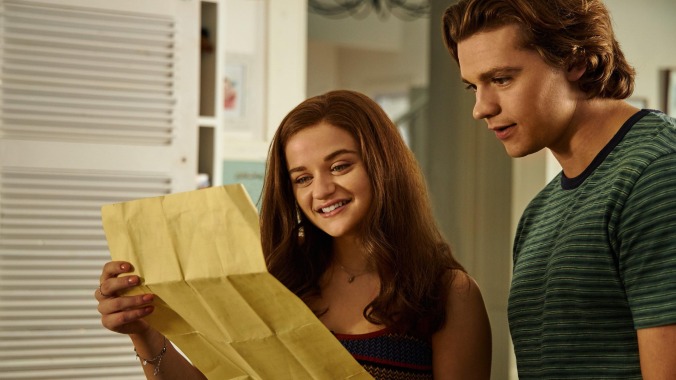Pucker up for the lackluster finale to Netflix's Kissing Booth
The Kissing Booth 3 is no better than the other two entries in the hit rom-com trilogy


The minor emotional problems of hot, rich teenagers may have fueled dozens of TV dramas, but they’ve officially run out of steam in the third and final installment of Netflix’s The Kissing Booth franchise. While there was some novelty in just how troublingly sexist the first movie was and a different kind of novelty in how the series tried to evolve in its second installment, all that’s left in this stultifying trilogy capper is a bland teen dramedy that’s like The O.C. if none of the characters had personalities or Beverly Hills, 90210 without the camp. In fact, with its extended montages of road trips, summer bucket lists, flash mobs, water park shenanigans, and elaborate go-kart races, The Kissing Booth 3 doesn’t so much resemble a narrative film as an extended wrap party for the cast. The whole thing has the vibe of an Adam Sandler paid vacation flick, only with barely even the attempt at comedy.
To her credit, Joey King remains a charming anchor for this bafflingly successful franchise. Her take on just-graduated high school senior Elle Evans blends tomboy ease with teen queen charisma and an impressive emotional range. The problem is that The Kissing Booth 3 chooses to place Elle in a decidedly unrelatable conundrum for her summer after graduation: Will she attend Berkeley with her lifelong best friend Lee Flynn (Joel Courtney), as they’ve always planned? Or will she follow Lee’s hot older brother Noah (Jacob Elordi)—her brooding bad-boy boyfriend—to Harvard instead? The question of how Elle’s gotten into both of these impressive schools without any particular interest in academics is never broached. Instead, the focus is on choosing between two different picture-perfect futures, as she spends the summer casually living unchaperoned with Lee and Noah in their parents’ giant, glamorous beach house.
The Kissing Booth 3 does at least eventually get around to making the argument that Elle shouldn’t be basing her future on the question of which guy she wants to follow where. (This point comes courtesy of a nice scene with Molly Ringwald as Lee and Noah’s mom). But it takes the film so long to get to that thesis, and it’s so weirdly somber once it does, that for most of its runtime, The Kissing Booth 3 is like narrative sand slipping through your fingers. While the first film was about a budding forbidden romance and the second introduced some classic love-triangle elements, there’s no real hook to this final installment. Instead, it tries to anchor itself around the nuanced interpersonal conflicts of characters who’ve got all of the dimension of a piece of cardboard. Worst of all, The Kissing Booth 3 can’t decide if it wants Noah to be the brooding hothead of the first movie or the sad softboy of the second, and it lands on a middle ground that feels somehow even more toxic.
Indeed, it’s a shame that the Kissing Booth trilogy is so adamant about slotting itself into the rom-com genre when the most unique element of the series has always been Elle’s friendship with Lee. Of all the players in The Kissing Booth’s unnecessarily sprawling ensemble, King and Courtney have by far the best chemistry together. And it’s refreshing to see a teen movie keep a straight male/female dynamic truly platonic. Even visually, director Vince Marcello is at his most creative when he’s dramatizing Elle and Lee’s lifelong bond, including in a surprisingly moving memory montage towards the end of the film. The Kissing Booth 3’s sharpest insight is that going away to college doesn’t just put a strain on high-school romances; it can be equally scary for friendships, too. Yet the movie keeps sidelining the Elle/Lee throughline in favor of all sorts of unsatisfying dramatic threads—not to mention an almost masochistic desire to watch King cry that casts a weird pall over the second half of the film.
When it moves away from Elle and Lee’s rapport, The Kissing Booth 3 is as haphazard as the terribly composited green screen work that frequently supplements its South African location shooting. (The movie was filmed concurrently and fortuitously with the second installment ahead of the pandemic.) Too heightened to capture the realities of high school yet not romanticized enough to work as pure escapism, the Kissing Booth franchise has staked out a strange corner of Netflix’s increasingly crowded teen rom-com landscape, offering something like a mirror universe inverse of the far superior To All The Boys trilogy, which also ended this year. While the fans who made The Kissing Booth such an algorithmic hit will presumably feel a nostalgic pull at seeing its characters ride off into the sunset, parting won’t be such sweet sorrow for everyone else.